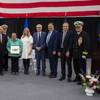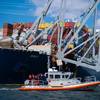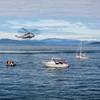Shipping's myriad safety inspections are facing a radical overhaul after high level meetings between the International Maritime Organization (IMO) and oil industry officials.
Ships arriving in port are routinely scrutinized by surveyors from five different bodies, often checking the same item. The system has failed to prevent numerous sinkings this year and last, causing dozens of deaths and widespread pollution.
IMO Secretary General Bill O'Neil said that it may now be time to combine all checks into a single and more effective inspection. "We've been meeting with all the organizations involved," said O'Neil, adding that he had received a mixed response.
"The chemical companies said - we're going to inspect our chemical carriers ourselves. We don't trust anyone else. But the oil companies might be more amenable," he said.
Tankers are the most thoroughly scrutinized type of ship. They are routinely inspected by the oil companies whose cargoes they carry, by their insurers and by officials of the countries they are visiting and of the countries whose flags they fly.
"We'd like to see these (inspections) somehow condensed," said O'Neil. "One or two people could do the inspection for everybody... in accordance with whatever each group wants."
He said the crews would then be freed up for more pressing duties than guiding the dozens of inspectors around the ship. So far this year, oil spills have hit the Galapagos Islands after the tanker Jessica ran aground in January and the Danish coast was fouled after the tanker Baltic Carrier collided with another vessel in March.
The cost of transporting oil rocketed last year as oil companies scrambled to book the newest and safest ships in the wake of the Erika disaster. French fishing grounds and beaches were fouled by over 8,000 tons of heavy fuel oil after the single-hulled tanker broke apart in the English Channel in December 1999.
Tanker sinkings have killed more than just fish and birds. Four crew died when the supertanker Heng San exploded and sank off India last month, while 11 died when the Kristal broke apart in heavy seas off Spain in February. O'Neil said the oil companies had expressed enthusiasm for his proposal, but said they would have to act carefully because of the liability issues involved. - (Reuters)
Sponsored Content
Chris-Marine’s solutions help to prolong engine lifetime

AST is now AST Networks, bringing you remote connectivity wherever you are

March 2024
 Read the Magazine
Read the Magazine

 Read the Magazine
Read the Magazine
This issue sponsored by:

New Orleans is Sinking, and it is Not Tragically Hip
March 2024
 Read the Magazine
Read the Magazine

 Read the Magazine
Read the Magazine
This issue sponsored by:

GAO: Coast Guard Should Better Monitor its Efforts to Credential Merchant Mariners
Subscribe for
Maritime Reporter E-News
Maritime Reporter E-News is the maritime industry's largest circulation and most authoritative ENews Service, delivered to your Email five times per week










